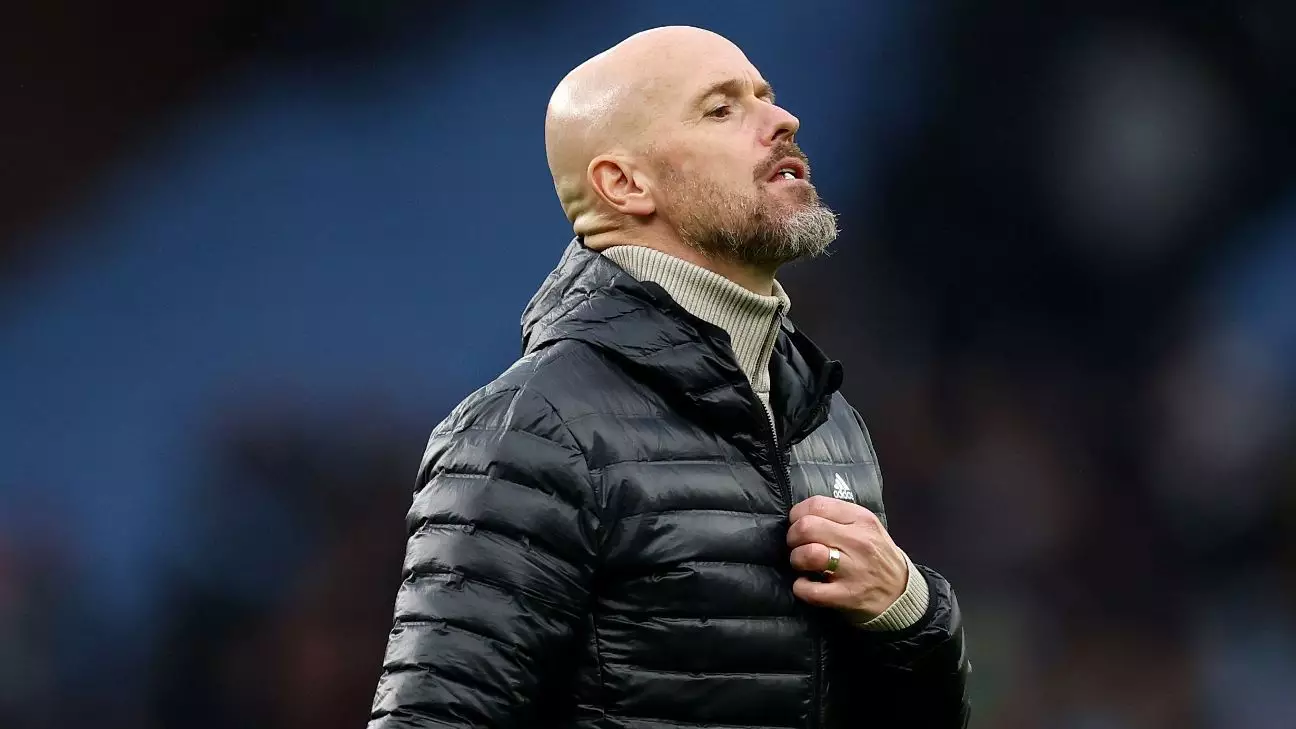Manchester United finds itself in a challenging situation early in the Premier League season, having recorded a disheartening goal tally of just five from their seven games. This striking statistic not only highlights the attacking woes of the squad but also marks the club’s worst start since the 1989-90 season. Following a sterile 0-0 draw against Aston Villa, manager Erik ten Hag emphasized the urgency for the team to “step up” in their goal-scoring efforts. This draw extended their troubling streak of three games without finding the net, further amplifying the existing frustrations among players and supporters alike.
Ten Hag’s words resonate loudly; a club of Manchester United’s stature should not be languishing with such low offensive returns. The implications of this stagnant scoring, particularly in a league as competitive as the Premier League, cannot be understated. Drawing matches without scoring provides little momentum for a club that aspires to return to its glory days. While Ten Hag noted the need for improvement, he also pointed to external pressures, such as ownership dynamics and speculation surrounding his managerial future.
Despite the bleak outlook in front of goal, there are glimmers of hope for United. The team’s defense has managed to secure four clean sheets, showcasing a level of organization and resilience that has been commendable. Ten Hag praised his squad’s defensive efforts, indicating that while the goal-scoring column remains woefully short, the foundations of a strong team performance are emerging. This juxtaposition serves as a double-edged sword; defensive solidity without offensive output is not a sustainable formula for success in modern football.
This defensive resilience is crucial for United’s stability. The clean sheets signal positivity for a side that has historically prided itself on its attacking prowess coupled with strong defensive performances. The challenge now lies in finding the right balance and instilling a more potent attacking philosophy that can convert clean sheets into victories.
Player performances also remain a focal point for review. Ten Hag highlighted encouraging contributions from individuals such as Marcus Rashford and Alejandro Garnacho. Rashford, in particular, has shown sparks of brilliance but needs consistency. The integration of Rasmus Højlund into the squad could bring a much-needed edge to the attack, adding depth and versatility that United sorely lacks at present.
Ten Hag’s acknowledgment of Højlund’s gradual return to fitness is crucial, as his addition could offer new tactical variations and goal-scoring threats. Each player must rise to the occasion; the onus is on them to be more clinical in possession and decisive in the opponent’s box. How these players adapt and coalesce will be a determining factor in whether United can transform their current situation.
With minority owner Sir Jim Ratcliffe watching closely, the atmosphere around the club feels charged with expectation. There is speculation surrounding Ten Hag’s position, leading to increased pressure to rectify the team’s misfortunes. However, the manager’s assertion that he feels secure in his job is promising, suggesting that the board recognizes the complexities of football management and the necessity for patience in the face of adversity.
The journey ahead is undeniably long, and an essential aspect of success will be the ability to manage expectations. United supporters rightfully demand results, but a carefully structured approach must underpin the squad’s progression. The club’s hierarchy needs to align with Ten Hag’s long-term vision to ensure consistency and stability as they navigate this challenging season.
Ultimately, Manchester United stands at a critical juncture. The need for an urgent revival in scoring cannot be overstated; it is vital for regaining competitive momentum in the league. However, Ten Hag’s insistence on focusing on the positives and the defensive improvements serves as a reminder that every cloud has a silver lining. If the attacking players can find their rhythm, combined with a steadfast defensive foundation, there’s still hope for a successful season. It will require collective determination, innovative tactics, and unwavering support from the club’s hierarchy and fans to steer Manchester United back into the upper echelon of English football.

Leave a Reply